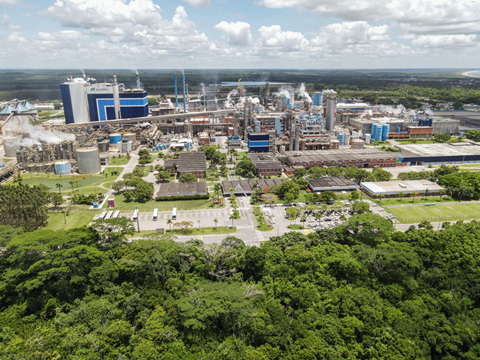
Market pulp producer Suzano has partnered with logistics solutions company VIX Logística to begin testing what it claims is the ‘first’ high-capacity electric truck in Brazil, anticipated to help remove 40 million tonnes of CO2 from the atmosphere by 2025.
The testing is said to be taking place at Suzano’s Aracruz site in the state of Espírito Santo, Brazil. The “Atlas” truck, developed by VIX, reportedly has the potential to tow up to 120 tonnes, save up to 8,300 litres of diesel per month and reduce CO2 emissions by approximately 21 tonnes.
Suzano hopes to reduce emissions by 20% on the route between the mill and Portocel, where products from Suzano’s Aracruz Unit are exported to different parts of the world. The company says the testing marks a significant step in accelerating the energy transition of Suzano’s pulp transportation fleet, enabling it to integrate more sustainable transportation practices throughout its operations.
Apparently, the implementation supports Suzano’s long-term targets, aligned with the UN Sustainable Development Goals in building a better world for people and the planet. Suzano claims the “Atlas” truck is said to be an improvement compared to traditional solutions available on the market, which weigh around a total of 40 tonnes (truck weight + load). Developed from a Mercedes-Benz Axor 3344 chassis, “Atlas” operates via electric propulsion and uses lithium iron phosphate (LFP) batteries.
Suzano and VIX Logística started testing “Atlas” in May this year. Suzano will be monitoring the vehicle’s operational performance during the first few months, with the intention of further deploying the alternative to other operations of the company.
Last month, Suzano announced it was set to purchase a 15% stake in Lenzing, a global producer of wood-based packaging materials, for €230 million. Besides producing textiles and non-wovens, Lenzing also develops fibre-based packaging materials that it describes as “naturally durable and biodegradable”.
DS Smith recently partnered with Carlsberg in Poland to introduce its Round Wrap multipack solution to selected product lines, designed to reduce CO2 emissions by 224 tonnes when compared to standard corrugated multipacks. The pack is said to be fully recyclable, and the curved corners aim to reduce the use of shrink film on the pallet.
If you liked this story, you might also enjoy:
How are the top brands progressing on packaging sustainability?
Sustainable Innovation Report 2024: Current trends and future priorities
Reuse vs. single use – which is better for the environment?
The ultimate guide to global plastic sustainability regulation














No comments yet